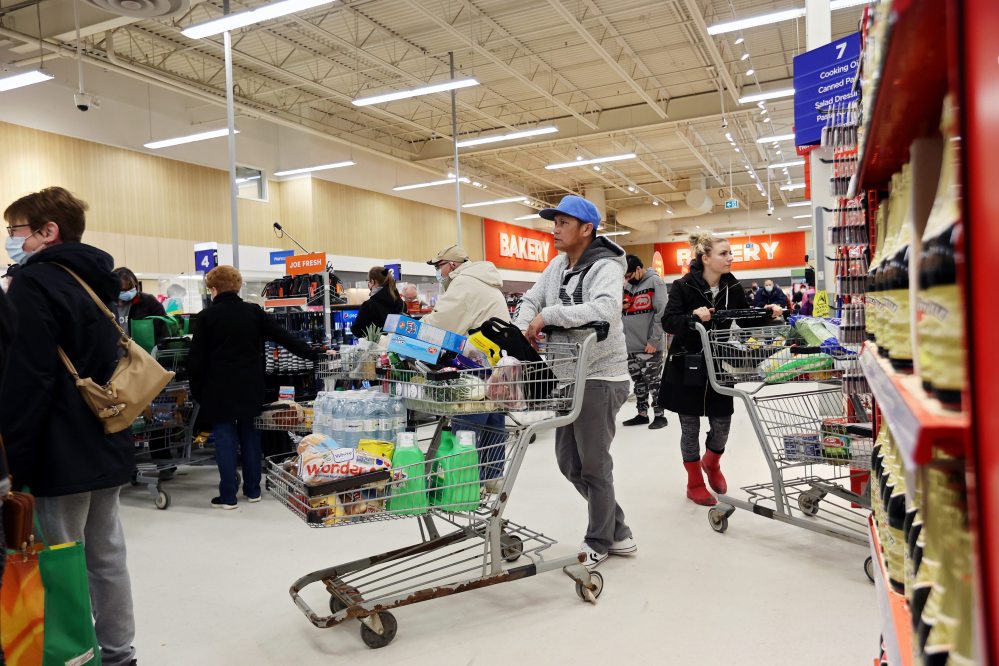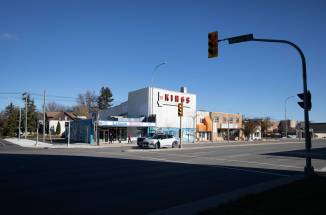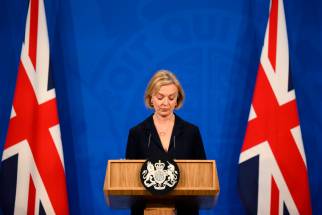Loblaw freezes all No Name prices until end of January
Read this article for free:
or
Already have an account? Log in here »
To continue reading, please subscribe:
Monthly Digital Subscription
$0 for the first 4 weeks*
- Enjoy unlimited reading on winnipegfreepress.com
- Read the E-Edition, our digital replica newspaper
- Access News Break, our award-winning app
- Play interactive puzzles
*No charge for 4 weeks then price increases to the regular rate of $19.00 plus GST every four weeks. Offer available to new and qualified returning subscribers only. Cancel any time.
Monthly Digital Subscription
$4.75/week*
- Enjoy unlimited reading on winnipegfreepress.com
- Read the E-Edition, our digital replica newspaper
- Access News Break, our award-winning app
- Play interactive puzzles
*Billed as $19 plus GST every four weeks. Cancel any time.
To continue reading, please subscribe:
Add Free Press access to your Brandon Sun subscription for only an additional
$1 for the first 4 weeks*
*Your next subscription payment will increase by $1.00 and you will be charged $16.99 plus GST for four weeks. After four weeks, your payment will increase to $23.99 plus GST every four weeks.
Read unlimited articles for free today:
or
Already have an account? Log in here »
Hey there, time traveller!
This article was published 17/10/2022 (1149 days ago), so information in it may no longer be current.
Canada’s biggest grocer is freezing prices on its No Name brand items until the end of January, a move that affects more than 1,500 products.
“As we’re going into the biggest buying period of the year, we’ve heard people talking about having to change buying habits, and we thought about what we could do. We believed this would be meaningful,” a Loblaw spokesperson wrote in an email.
Loblaw operates Real Canadian Superstore, Shoppers Drug Mart, and No Frills, among other stores across the country.

Galen Weston, Loblaw’s chairman and president, cited food price inflation as the reason for the retailer’s decision.
Grocery prices rose 10.8 per cent year over year last August, according to Statistics Canada data.
“Maddeningly, much of this is out of our control” as food suppliers pass on higher costs to Loblaw, Weston said.
Most price increases are already baked in to what people see in stores, according to Tom De Nardi, co-owner of grocery centre Piazza De Nardi and wholesaler Mondo Foods.
Wages, freight prices and raw materials’ input costs have skyrocketed, leading to more expensive grocery bills, but lately, there’s been price stabilization in many areas, De Nardi said.
“A good number of products in our store that we have direct control over, prices will not move — at least for the next couple of months,” De Nardi said.
Grocers are able to freeze their house-label prices because they control the supply chain from the beginning to shelf pricing, said Marty Weintraub, partner and national retail consulting leader at Deloitte Canada.
“It gets a lot harder with national brands because… you don’t control the supply chain,” he said.
Smaller retailers reliant on distributors have less control, De Nardi noted.
“I was very surprised that (Loblaw’s announcement) didn’t happen before. It’s fairly easy for Loblaw to execute on this,” said Sylvain Charlebois, professor of food distribution and policy at Dalhousie University.
He called the timing interesting. Last week, the federal government announced a committee would investigate rising food prices in Canada. On Wednesday, Statistics Canada is set to release a report on September’s inflation levels.
“Grocery stores will again face a barrage of criticism,” Charlebois noted.
That was not the case on Monday.
Finance Minister Chrystia Freeland praised Loblaw’s move, calling it a “great decision.” Corporate Canada as a whole needs to do what it can to push back against the high prices that are making life hard for many families across the country, she said.
“I would really encourage all Canadian companies to take a Team Canada approach to the challenge of the cost of living,” Freeland said.

“We should all be taking seriously our responsibility to do everything we can to help all Canadians get through this.”
The next couple of days will be key for major retailers such as Sobeys and Walmart to announce their own price freezes, if they choose to do so, Charlebois said.
Neither company responded to the Free Press by print deadline.
“They don’t actually have the same private label portfolio. It’s going to be more difficult for them to implement any changes,” Charlebois said of Sobeys.
A price freeze is unattainable for Downtown Family Foods since the Donald Street store receives stock from Sobeys, according to co-owner Kevin Schmidt.
“When those prices go up, we can only sustain things for so long before we have to increase our prices too,” he said.
Issa Qandeel, owner of Blady Middle Eastern, echoed Schmidt.
“How can we (freeze) prices when the government has announced that minimum wage is up and the gas is up and everything is up?” he said. “We’re not making as much as we were before. Our margins are down and down.”
The cost of pasta sauce has slightly decreased, Schmidt said. Canned goods and meats have been stable, but produce costs will rise as winter hits, he said.
Companies such as Loblaw can increase prices of clothing and pharmaceutical items if they’re losing money on food, Schmidt noted.
“They have so many different avenues that they can (use to) compensate,” he said, adding shops such as Downtown Family Foods don’t have similar options.
He’s worried about losing customers.
“It can change a person’s mind as to where they shop, especially in this day and age when you have increases to prices on everything,” Schmidt said.
Grocery shopper Avra Love said on Monday that she would veer to No Name products if the prices don’t move.

“I’m not too particular between one brand of pineapples or beans or the other,” she said.
Mark Asvan, a Superstore shopper, said he will continue to second guess what he’s buying — “do I need it or do I want it?” — even with a price freeze.
“We don’t want any surprises. They say January (is when the freeze ends). What happens come February?” Asvan said.
Loblaw follows the lead of German company Lidl and French supermarket chain Carrefour, who announced price freezes in June and August, respectively.
NDP Leader Jagmeet Singh has linked more expensive groceries to “greedflation,” suggesting rich CEOs are behind the rising cost of food.
Loblaw reported net earnings of $387 million in its most recent quarter, up by $12 million from last year and $101 million from the same period in 2019.
Singh called Loblaw’s decision to freeze No Name prices a positive step, but said the grocer could have acted sooner.
Independent grocers could see higher prices because of such actions, according to Gary Sands, senior vice-president of public policy for the Canadian Federation of Independent Grocers.
“If a big chain retailer is squeezing a large supplier and they acquiesce to those demands, we could see a ripple effect on how they in turn deal with the smaller players in the market,” he said.
— With files from the Canadian Press
gabrielle.piche@winnipegfreepress.com

Gabby is a big fan of people, writing and learning. She graduated from Red River College’s Creative Communications program in the spring of 2020.
Our newsroom depends on a growing audience of readers to power our journalism. If you are not a paid reader, please consider becoming a subscriber.
Our newsroom depends on its audience of readers to power our journalism. Thank you for your support.









